The President of Association of Bureau De Change Operators of Nigeria (ABCON), Aminu Gwadebe, says low remittances from international Money Transfer Service Operators, (IMTSO), occasioned by the COVID-19 lock down is among the reasons why there is a liquidity crisis in the foreign exchange market.
Gwadebe who disclosed this during a television interview with Channels Television on Wednesday, stated that the shutdown of the entire BDC sub-sector window, the shutdown of airports which has affected foreign travelers who are a source of forex especially to BDCs, cancellation of autonomous transactions from the banks to the BDCs also contributed to the liquidity crisis.
“Since the lockdown of the airports, the airports were shut down in March, and since then the entire BDC sub-sector window was shut down, because our sources include the International Money Transfer Service Operators (IMTSO) which is through the banks, then the travellers that are coming from abroad, the walk-in customers, the autonomous for 2, 3 years now, autonomous transactions that are coming from banks have been cancelled. So if you look at it all the sources are not there. So that’s why there is a liquidity crisis.”
Gwadebe said that the pandemic caused supply disruptions as the price of crude oil went down, even foreign exchange inflow from abroad also went down leading to the drying up of a lot of sources of foreign exchange. He said that once there is a liquidity crisis, there will be capital flight from foreign portfolio investors as they will move to convert their local assets to foreign assets which they regard as safer. He said a lot of speculators indulge in buying up a foreign exchange that they don’t need and keep in the bank. This he said puts a lot of pressure on the market.
The ABCON boss lamented that the country’s import bill remains very high as a lot of foreign exchange is spent on food importation, petroleum products importation and even on medical supplies. He said that although the CBN resumed $100m weekly sales of foreign exchange for school fees, medical supplies and SMEs, it is still grossly inadequate as there is still pressure at the retail end of the market.
While commending the CBN for the exchange rate unification plan, Gwadebe said you cannot have the same product with different rates especially when you know you have liquidity crisis, when there is a foreign inflow crisis. He said that investors are checking out, the crude oil sales are down, diaspora remittances are going to be affected by 20% according to IMF.

 Inspirational1 week ago
Inspirational1 week ago
 Aviation1 week ago
Aviation1 week ago
 Featured6 days ago
Featured6 days ago
 Crime6 days ago
Crime6 days ago
 Featured6 days ago
Featured6 days ago
 Business5 days ago
Business5 days ago
 Editorial3 days ago
Editorial3 days ago
 Business2 days ago
Business2 days ago

